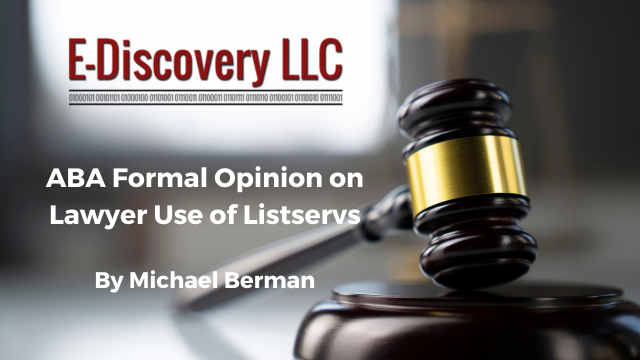
[EDRM Editor’s Note: The opinions and positions are those of Michael Berman.]
Sam Skolnik reported that the ABA Issues Opinion on Disclosing to Clients When Using Listservs (bloomberglaw.com)(May 8, 2024). The article states:
Without informed client consent, the opinion found, “a lawyer participating in listserv groups should not disclose any information relating to the representation that may be reasonably connected to an identifiable client.”
Sam Skolnik, ABA Issues Opinion on Disclosing to Clients When Using Listservs (bloomberglaw.com)(May 8, 2024).
ABA Model Rule 1.6 states that lawyers “shall not reveal information relating to the representation of a client unless the client gives informed consent, the disclosure is impliedly authorized in order to carry out the representation,” or in other rare, specifically-defined circumstances.
Formal Opinion 511 states: “Rule 1.6 prohibits a lawyer from posting questions or comments relating to a representation to a listserv, even in hypothetical or abstract form, without the client’s informed consent if there is a reasonable likelihood that the lawyer’s questions or comments will disclose information relating to the representation that would allow a reader then or later to infer the identity of the lawyer’s client or the situation involved. A lawyer may, however, participate in listserv discussions such as those related to legal news, recent decisions, or changes in the law, without a client’s informed consent if the lawyer’s contributions will not disclose, or be reasonably likely to lead to the disclosure of, information relating to a client representation.”
…. a lawyer must have the client’s informed consent to post a hypothetical to a listserv if, under the circumstances, the posted question could “reasonably lead to the discovery of” information relating to the representation because there is a “reasonable likelihood” that the reader will be able to ascertain the identity of the client or the situation involved.
ABA Standing Committee on Ethics and Professional Responsibility, Formal Opinion 511 (May 8, 2024) (discussing Confidentiality Obligations of Lawyers Posting to ListServs).
The ABA adds that: “Comment 3 explains that Rule 1.6 protects ‘all information relating to the representation, whatever its source” and is not limited to communications protected by attorney-client privilege.’”
Lawyers may disclose information relating to the representation with the client’s informed consent. Id. “Lawyers who anticipate using listservs for the benefit of the representation may seek to obtain the client’s informed consent at the outset of the representation, such as by explaining the lawyer’s intention and memorializing the client’s advance consent in the lawyer’s engagement agreement.” Id.
In short:
Without informed client consent, a lawyer participating in listserv groups should not disclose any information relating to the representation that may be reasonably connected to an identifiable client. Comment 4 to Rule 1.6 envisions the possibility of lawyers using hypotheticals to discuss client matters. However, a lawyer must have the client’s informed consent to post a hypothetical to a listserv if, under the circumstances, the posted question could “reasonably lead to the discovery of” information relating to the representation because there is a “reasonable likelihood” that the reader will be able to ascertain the identity of the client or the situation involved.
ABA Standing Committee on Ethics and Professional Responsibility, Formal Opinion 511 (May 8, 2024) (discussing Confidentiality Obligations of Lawyers Posting to ListServs).
General consultations “that do not involve disclosure of information relating to the representation of a specific client” do not require client consent.
Careful lawyers will often be able to use listservs to ask fellow practitioners for cases and articles on topics, for forms and checklists, and for information on how various jurisdictions address a court-connected concern without enabling other lawyers to identify the lawyer’s client or the situation involved. Posting this sort of inquiry on a listserv, to the extent possible without disclosing information relating to the representation, may have advantages over a lawyer-to-lawyer consultation precisely because it is broadly disseminated. Maryland State Bar Association Ethics Opinion 2015-03 described peer-to-peer lawyer listservs as a “powerful tool” providing “the opportunity for a lawyer to test his or her understanding of legal principles and to clarify the best way to proceed in unique situations.”
ABA Standing Committee on Ethics and Professional Responsibility, Formal Opinion 511 (May 8, 2024) (discussing Confidentiality Obligations of Lawyers Posting to ListServs).
The ABA cautions that “before any post, a lawyer must ensure that the lawyer’s post will not jeopardize compliance with the lawyer’s obligations under Rule 1.6.”


